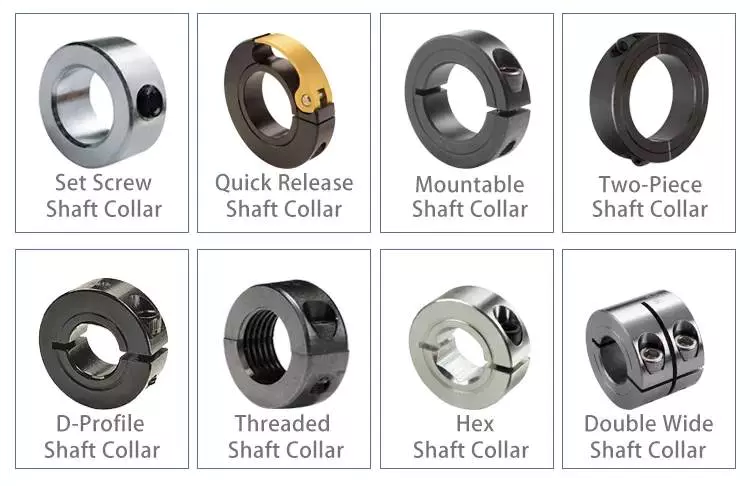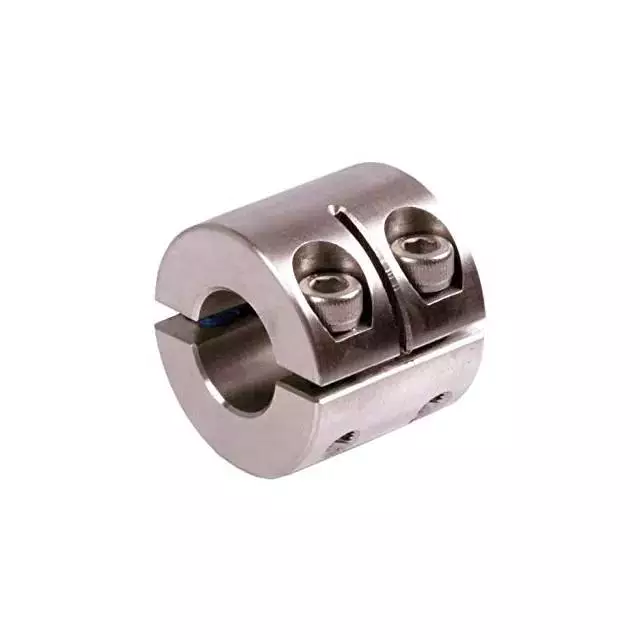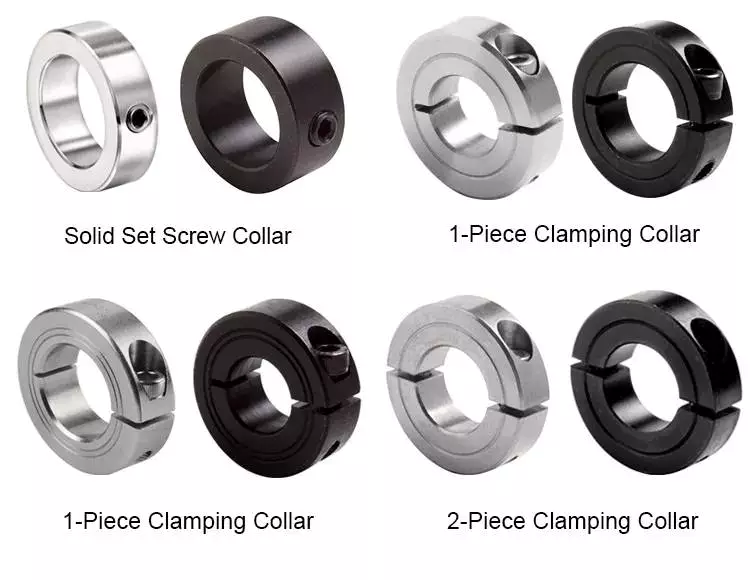Product Description
|
Name |
Nylon Fixing Bracket White HDPE washers |
|
Material |
Nylon,POM,PE,UPE,PTFE,ABS,PMMA,PC,PP,PEEK,PU,etc. |
|
Color |
White,black,green,blue,yellow,etc |
|
Diameter |
customized |
|
Tolerance |
±0.05 |
|
Shape |
As per your drawing Or the sample |
|
Certification |
ISO9001,SGS,Test Report,RoSH |
|
Free Sample |
Available |
|
Shape |
Sheet, rod, tube, gear, pulley, guide rail, and Plastic parts so on |
|
Advantage |
One stop procurement |
|
Other |
24 hours instant and comfortable customer service. |
|
Shipping status notification during delivery. |
|
|
Regular notification of new styles & hot selling styles. |
| Certification: | CE |
|---|---|
| Color: | Customized |
| Customized: | Customized |
| Standard: | International |
| Type: | Bearing |
| Material: | Plastic |
| Samples: |
US$ 0/Piece
1 Piece(Min.Order) | |
|---|
| Customization: |
Available
| Customized Request |
|---|
Can I find information on alternatives to traditional shaft collars for specific applications?
Yes, information on alternatives to traditional shaft collars for specific applications is available. In addition to traditional shaft collars, there are various innovative solutions and alternative devices that can be used depending on the specific application requirements. Here are some sources where you can find information on alternatives to traditional shaft collars:
- Manufacturer Websites and Catalogs: Many manufacturers of mechanical components provide detailed information on their websites or in product catalogs about alternative devices or solutions to traditional shaft collars. These resources often highlight specific applications, industries, or challenges where alternative devices may be more suitable. Exploring manufacturer websites and requesting catalogs can help you discover innovative options.
- Technical Publications and Journals: Technical publications and journals focused on mechanical engineering, automation, or industrial applications often feature articles or case studies discussing alternative devices for various applications. These resources provide insights into the latest advancements and emerging technologies in the field. Accessing academic databases, engineering libraries, or subscribing to relevant publications can help you access this information.
- Engineering Conferences and Seminars: Attending engineering conferences, seminars, or workshops related to mechanical components or industrial automation can provide opportunities to learn about alternative devices through presentations, panel discussions, or technical sessions. These events often bring together experts, researchers, and industry professionals who share their knowledge and present innovative solutions. Checking event calendars, industry association websites, or engineering organizations can help you find relevant conferences or seminars.
- Online Engineering Forums and Communities: Online engineering forums, communities, and social media groups dedicated to mechanical engineering or industrial automation can be valuable sources of information on alternative devices. These platforms allow engineers and professionals to exchange ideas, discuss challenges, and share their experiences with different solutions. Participating in these forums, asking questions, or searching for relevant discussions can provide insights into alternative devices for specific applications.
- Consulting with Industry Experts: Seeking advice from industry experts, such as mechanical engineers, industrial automation specialists, or application consultants, can help you explore alternative devices tailored to your specific application requirements. These professionals have in-depth knowledge of the field and can provide personalized recommendations based on your needs. They can be contacted through engineering consulting firms, professional networks, or by reaching out to manufacturers directly.
When considering alternatives to traditional shaft collars, it is important to thoroughly evaluate the specific application requirements, including factors such as load capacity, precision, environmental conditions, space limitations, and maintenance considerations. Each alternative device may have its own advantages and limitations, and it is crucial to select the most suitable option based on the unique needs of your application.
Where can I find information on the materials used in manufacturing shaft collars?
If you are looking for information on the materials used in manufacturing shaft collars, there are several sources where you can find relevant information. Here are some common resources to consider:
- Manufacturer Websites: Many manufacturers of shaft collars provide detailed information about the materials they use in their product specifications or technical datasheets. Visiting the websites of specific collar manufacturers and exploring their product documentation or resources section can help you find information about the materials used in their collars. This information may include the type of material (such as steel, stainless steel, aluminum, or plastic) and any specific properties or characteristics associated with the material.
- Product Catalogs and Brochures: Manufacturers often publish product catalogs or brochures that provide an overview of their collar offerings. These catalogs may include information about the materials used in manufacturing the collars. You can request catalogs from manufacturers directly or check their websites for downloadable versions. The catalogs may highlight the material properties and advantages of using specific materials for different applications.
- Material Databases: Online material databases or directories can be valuable resources for finding information about specific materials used in manufacturing shaft collars. These databases typically provide comprehensive information about various materials, including their composition, mechanical properties, corrosion resistance, temperature tolerance, and other relevant characteristics. Examples of such databases include MatWeb, Engineering Toolbox, or specialized materials databases maintained by industry organizations or universities.
- Technical Standards and Specifications: Technical standards and specifications related to mechanical components can often include information about the materials used in their construction. Standards organizations or industry associations may release documents that outline the material requirements for shaft collars or provide guidelines for material selection. Accessing these standards or specifications can provide insights into the recommended materials for shaft collar manufacturing.
- Consulting with Manufacturers or Suppliers: If you have specific questions about the materials used in manufacturing shaft collars, reaching out directly to manufacturers or suppliers can be beneficial. They can provide detailed information about the materials they use, including their composition, properties, and any specific treatments or coatings applied to enhance performance. Contacting manufacturers or suppliers allows for direct communication and the opportunity to address any specific concerns or requirements you may have.
When seeking information on materials used in shaft collar manufacturing, it is important to consider factors such as desired properties (e.g., strength, corrosion resistance), environmental compatibility, and application-specific requirements. This will help you make informed decisions about selecting shaft collars that are suitable for your specific needs and operating conditions.
What is a shaft collar and its role in mechanical systems?
A shaft collar is a mechanical component used in various applications to provide support, positioning, and locking functions for rotating shafts. It is a cylindrical device that fits around a shaft and is typically secured in place using set screws or clamping mechanisms. The collar is designed to prevent axial movement of the shaft and maintain its position within a mechanical system. Here is a detailed explanation of the role and significance of shaft collars in mechanical systems:
Support and Positioning:
One of the primary roles of a shaft collar is to provide support and positioning for a shaft within a mechanical system. It acts as a physical barrier that prevents the shaft from moving along its axial direction. By securing the collar at a specific location along the shaft, it helps maintain the desired position of the shaft relative to other components, such as bearings, gears, or pulleys. This support and positioning function ensures proper alignment and operation of the system, preventing unwanted vibrations, misalignment, or excessive wear.
Axial Load Distribution:
Shaft collars also help distribute axial loads along the length of the shaft. When a mechanical system experiences axial forces or thrust, the collar can help transmit and distribute these forces to the supporting components, such as bearings or thrust washers. By evenly distributing the load, shaft collars help prevent localized stress concentrations and improve the overall load-bearing capacity of the system.
Limiting Radial Movement:
In addition to preventing axial movement, shaft collars can also limit radial movement of the shaft within a given range. The collar’s design and tight fit around the shaft create a mechanical barrier that restricts radial play or shifting of the shaft. This is particularly important in applications where precise positioning or clearance control is required, such as in linear motion systems, conveyor systems, or machinery with rotating components.
Securing Components:
Shaft collars often serve as a means of securing other components onto the shaft. They can act as a stopping point or reference surface against which other elements, such as bearings, sprockets, gears, or pulleys, can be mounted. By securing these components with set screws or clamping mechanisms, shaft collars ensure their proper alignment and prevent unintentional movement or disengagement during operation.
Adjustability and Easy Installation:
Another advantage of shaft collars is their adjustability and ease of installation. They can be easily positioned and moved along the shaft without requiring complex tools or specialized equipment. This adjustability allows for fine-tuning of the shaft’s position and alignment within the system. Additionally, the simplicity of their design and installation makes shaft collars a cost-effective solution for various mechanical applications.
Overall, shaft collars play a significant role in mechanical systems by providing support, positioning, load distribution, and component securing functions. Their presence helps ensure the stability, alignment, and efficient operation of rotating shafts in diverse applications across industries such as manufacturing, automation, robotics, and machinery.
editor by CX 2023-11-03




